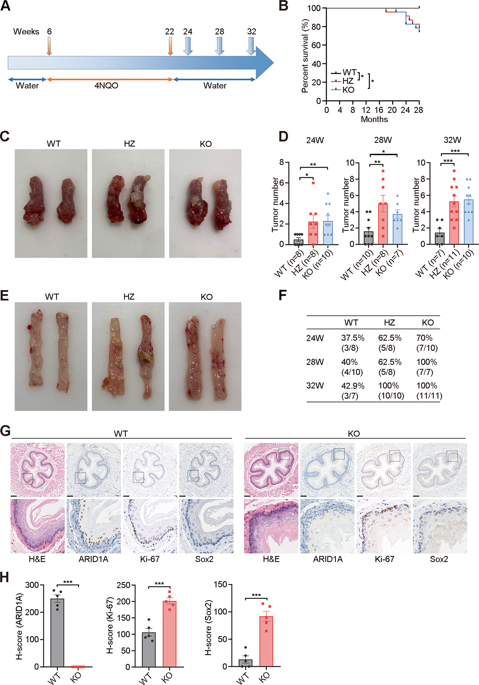当前位置:
X-MOL 学术
›
Cell Death Differ.
›
论文详情
Our official English website, www.x-mol.net, welcomes your feedback! (Note: you will need to create a separate account there.)
ARID1A prevents squamous cell carcinoma initiation and chemoresistance by antagonizing pRb/E2F1/c-Myc-mediated cancer stemness.
Cell Death and Differentiation ( IF 12.4 ) Pub Date : 2019-12-12 , DOI: 10.1038/s41418-019-0475-6 Qingyu Luo 1 , Xiaowei Wu 1 , Wan Chang 1 , Pengfei Zhao 1 , Yabing Nan 1 , Xiaolin Zhu 1 , Jonathan P Katz 2 , Dan Su 3 , Zhihua Liu 1
Cell Death and Differentiation ( IF 12.4 ) Pub Date : 2019-12-12 , DOI: 10.1038/s41418-019-0475-6 Qingyu Luo 1 , Xiaowei Wu 1 , Wan Chang 1 , Pengfei Zhao 1 , Yabing Nan 1 , Xiaolin Zhu 1 , Jonathan P Katz 2 , Dan Su 3 , Zhihua Liu 1
Affiliation

|
Squamous cell carcinoma (SCC) is defined as a category of aggressive malignancies arising from the squamous epithelium of various organs. Resistance to chemotherapies is a common feature of SCCs, which leads to a poor prognosis among SCC patients. Recently, studies have illustrated the essential tumor suppressive role of ARID1A in several cancer types, but its role in SCCs remains unclear. Cancer stemness has been recognized as a main reason for tumorigenesis and is commonly correlated with chemoresistance, yet the relationship between ARID1A and cancer stemness remains unknown. In this study, we showed that Arid1a conditional knockout mice had a high incidence of SCCs occurring in the tongue and esophagus. ARID1A depletion promoted tumor initiation and cancer stemness in human SCC cells. Mechanistic studies revealed that ARID1A blocked the interaction between cyclin-dependent kinases (CDKs) and retinoblastoma protein (Rb), reducing the phosphorylation of Rb. Dephosphorylated Rb suppressed E2F1 activity and then suppressed cancer stemness by inactivating c-Myc. Furthermore, we showed that ARID1A depletion significantly increased the chemoresistance of SCC and that a CDK inhibitor exhibited a favorable effect on rescuing the chemoresistance caused by ARID1A loss. Collectively, our study showed that ARID1A inhibits the cancer stemness of SCCs by competing with CDKs to bind with Rb to inhibit the E2F1/c-Myc pathway.
中文翻译:

ARID1A 通过拮抗 pRb/E2F1/c-Myc 介导的癌症干性来预防鳞状细胞癌的发生和化疗耐药。
鳞状细胞癌(SCC)被定义为由各种器官的鳞状上皮引起的一类侵袭性恶性肿瘤。化疗耐药是 SCC 的共同特征,导致 SCC 患者预后不良。最近,研究表明 ARID1A 在几种癌症类型中的重要肿瘤抑制作用,但其在 SCC 中的作用仍不清楚。癌症干性已被认为是肿瘤发生的主要原因,并且通常与化学抗性相关,但 ARID1A 与癌症干性之间的关系仍然未知。在这项研究中,我们发现 Arid1a 条件性基因敲除小鼠的舌头和食道中 SCC 的发生率很高。ARID1A 耗竭促进了人类 SCC 细胞的肿瘤发生和癌症干细胞。机理研究表明,ARID1A 阻断了细胞周期蛋白依赖性激酶 (CDK) 和视网膜母细胞瘤蛋白 (Rb) 之间的相互作用,从而降低了 Rb 的磷酸化。去磷酸化的 Rb 抑制 E2F1 活性,然后通过灭活 c-Myc 抑制癌症干性。此外,我们发现 ARID1A 耗竭显着增加了 SCC 的化学抗性,并且 CDK 抑制剂对挽救由 ARID1A 缺失引起的化学抗性表现出良好的效果。总的来说,我们的研究表明,ARID1A 通过与 CDK 竞争与 Rb 结合以抑制 E2F1/c-Myc 通路来抑制 SCC 的癌症干性。此外,我们发现 ARID1A 耗竭显着增加了 SCC 的化学抗性,并且 CDK 抑制剂对挽救由 ARID1A 缺失引起的化学抗性表现出良好的效果。总的来说,我们的研究表明,ARID1A 通过与 CDK 竞争与 Rb 结合以抑制 E2F1/c-Myc 通路来抑制 SCC 的癌症干性。此外,我们发现 ARID1A 耗竭显着增加了 SCC 的化学抗性,并且 CDK 抑制剂对挽救由 ARID1A 缺失引起的化学抗性表现出良好的效果。总的来说,我们的研究表明,ARID1A 通过与 CDK 竞争与 Rb 结合以抑制 E2F1/c-Myc 通路来抑制 SCC 的癌症干性。
更新日期:2019-12-13
中文翻译:

ARID1A 通过拮抗 pRb/E2F1/c-Myc 介导的癌症干性来预防鳞状细胞癌的发生和化疗耐药。
鳞状细胞癌(SCC)被定义为由各种器官的鳞状上皮引起的一类侵袭性恶性肿瘤。化疗耐药是 SCC 的共同特征,导致 SCC 患者预后不良。最近,研究表明 ARID1A 在几种癌症类型中的重要肿瘤抑制作用,但其在 SCC 中的作用仍不清楚。癌症干性已被认为是肿瘤发生的主要原因,并且通常与化学抗性相关,但 ARID1A 与癌症干性之间的关系仍然未知。在这项研究中,我们发现 Arid1a 条件性基因敲除小鼠的舌头和食道中 SCC 的发生率很高。ARID1A 耗竭促进了人类 SCC 细胞的肿瘤发生和癌症干细胞。机理研究表明,ARID1A 阻断了细胞周期蛋白依赖性激酶 (CDK) 和视网膜母细胞瘤蛋白 (Rb) 之间的相互作用,从而降低了 Rb 的磷酸化。去磷酸化的 Rb 抑制 E2F1 活性,然后通过灭活 c-Myc 抑制癌症干性。此外,我们发现 ARID1A 耗竭显着增加了 SCC 的化学抗性,并且 CDK 抑制剂对挽救由 ARID1A 缺失引起的化学抗性表现出良好的效果。总的来说,我们的研究表明,ARID1A 通过与 CDK 竞争与 Rb 结合以抑制 E2F1/c-Myc 通路来抑制 SCC 的癌症干性。此外,我们发现 ARID1A 耗竭显着增加了 SCC 的化学抗性,并且 CDK 抑制剂对挽救由 ARID1A 缺失引起的化学抗性表现出良好的效果。总的来说,我们的研究表明,ARID1A 通过与 CDK 竞争与 Rb 结合以抑制 E2F1/c-Myc 通路来抑制 SCC 的癌症干性。此外,我们发现 ARID1A 耗竭显着增加了 SCC 的化学抗性,并且 CDK 抑制剂对挽救由 ARID1A 缺失引起的化学抗性表现出良好的效果。总的来说,我们的研究表明,ARID1A 通过与 CDK 竞争与 Rb 结合以抑制 E2F1/c-Myc 通路来抑制 SCC 的癌症干性。



























 京公网安备 11010802027423号
京公网安备 11010802027423号